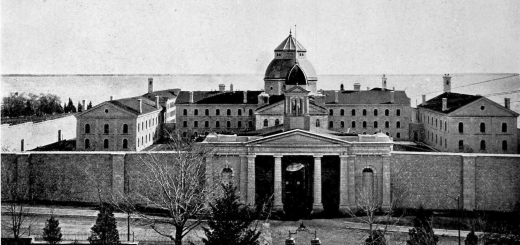Breaking New ‘Tertiary’ Ground? Marco Muzzo in the Shadow of St. Cloud
By now we have all heard the story of three children and their grandfather killed in a car accident in Vaughan, ON on September 27th due to the actions of an alleged drunk driver. The heart wrenching public statements made by a father who must bury all of his children and a mother who lost both her children and her father still resonate within the community.
In the aftermath of the accident, thousands of people rallied together and donated over $250,000 to the Neville-Lake family’s fund. The emotional scars of this tremendous loss are still raw and cut deeper than the physical scars from which the survivors of the accident, the children’s grandmother and great-grandmother, must heal.
Arrested and charged with the crimes is the grandson of the founder (now deceased) of a successful construction development company and one of the wealthiest men in Canada (~$1.8 billion net worth). This week, on November 12, Marco Muzzo is slated to have yet another court appearance on a number of criminal charges, including impaired driving causing death.
Muzzo, the 29-year-old Director of Marel Contractors, is currently represented by criminal defense lawyer Brian Greenspan. In recent reports, Greenspan has indicated that the defense team is still reviewing disclosure from the Crown and that it is too early to determine how the defense might proceed.
In the meantime, an impending Muzzo bail hearing is fodder for legal debate and prediction.
St. Cloud rears its head
This case brings R v St. Cloud, 2015 SCC 27 [St. Cloud] to the fore given the strong likelihood of a contested bail hearing. TheCourt published an article on the importance of St. Cloud in clarifying the application of appropriate grounds to deny bail as well as the procedure for reviewing bail decisions.
To recap, there are three main grounds for a Justice of the Peace to deny bail. The primary ground is based on a high risk that an accused may fail to attend court. The secondary ground is based on whether public safety is at risk if the accused is released pending trial. The tertiary ground is concerned with whether approving bail would compromise confidence in the administration of justice.
One key finding of the Supreme Court of Canada (“SCC”) in St. Cloud was that each of these grounds are independent bases upon which bail decisions can be made. What this means—and its relevance in the Muzzo case—is that in theory a person can be denied bail solely on tertiary grounds. Even if one does not pose a threat to the public and is not a flight risk, they can nonetheless be held in jail pending trial.
Obstacles to release
A contested Muzzo bail hearing is particularly intriguing because given the publicly available facts of the case, it is quite possible that he will fall into the exceptionally rare category of cases where the Crown argues against bail solely on tertiary grounds.
At the present time, TheCourt was unable to identify a case in Canada where an accused was denied bail solely on this ground. The Muzzo case has precedent-setting potential to establish the tertiary ground as an independent avenue used by the courts to deny bail. The SCC put it in writing in St. Cloud, but we may see this put into practice with Marco Muzzo as the example.
To support this proposition, let’s begin with the primary ground. In the criminal justice system, bail comes with certain expectations. The main expectation is that the accused will respect the obligation to attend court when summoned. Evidence supporting the notion that an accused can be trusted to not abscond from justice includes having strong ties to the community and reliable sureties willing to provide the necessary supervision.
It seems apparent that Muzzo would not be a flight risk. First, Muzzo has extensive family connections in the GTA. The Muzzo clan is a high profile family within the Canadian business community and has led a well-established enterprise for decades. In particular, Marco Muzzo has strong ties to the community as a resident of the GTA and is Director of the family business. Also, prior to the accident, Muzzo was to be married and one can presume that he fully intended to reside and start a family in the GTA. Furthermore, given the national attention this case has received, the chance that he could successfully flee from prosecution would be highly improbable. This is not to mention the fact that his sureties would be concerned with the public scrutiny and legal consequences that they could face if they assisted Muzzo in breaking his bail conditions.
When it comes to the secondary grounds for denying bail, I suggest that Muzzo could also make a strong argument for why he would not pose a threat to the public while on bail pending trial. First, as previously noted, given the media circus that this case has created it would be foolhardy on the part of Muzzo to entertain the idea of breaking any bail condition. Other factors considered under this ground are the degree of planning and deliberation, involvement of firearms, surrounding circumstances of the offense, etc. Muzzo could successfully challenge the suggestion that he poses a threat to the public by constructing a workable release plan which includes not driving or drinking alcohol. Moreover, he could also say that the facts of the case, while tragic, do not reflect an individual that is criminogenic or calculating in their desire to harm others.
In the probable event that Muzzo can clear the hurdles of the primary and secondary ground, it leaves the Crown with the task of arguing that despite not meeting the standard required of establishing these grounds, Muzzo should rightfully be held in jail for a tertiary reason. This seemingly nebulous tertiary category creates room for the consideration of other variables such as a crime that is particularly heinous or senseless. It will be interesting to see how the Crown decides to fill in the factors that could lead to compromising confidence in the justice system.
Predicting an outcome
I predict that if a contested bail hearing is held, the Crown will likely argue and succeed solely on tertiary grounds. The reason is because the nature of the offense is grave. Four lives were lost and two others were seriously injured because of the alleged actions of Marco Muzzo. Public outrage has been intense. Large protests in front of the courthouse during each of Muzzo’s appearances in court have prompted members of the Muzzo family to hire private security to manage the backlash.
An added layer of complexity to the sensitive circumstances of the case is that the vast wealth and social and political connections of the Muzzo family raise concerns of class bias within our justice system. There is no doubt that how Muzzo is treated will be under a magnifying glass because of the expectation that his money will curry favours.
The indignation levied at the accused since the incident is palpable. If there is any sort of mindless and selfish choice that garners the ire of the general public, it is the decision to drive a vehicle while intoxicated. This is not to mention the intensification of that anger when innocent lives are destroyed as a result.
There is no doubt that if Muzzo is released, many will question the fairness of our legal system. The inevitable question on the mind of most laypeople will be how someone accused of ending the lives of four people can get bail while people involved in less serious incidents not involving the loss of life are refused bail. Is the court prepared to respond to this pointed question?
At the end of the day, the defense could very well surprise us and not contest the bail. In the interim, Muzzo may steadily work out a plea agreement to resolve the case as quickly as possible. From the perspective of the Neville-Lake family, this would be an ideal scenario instead of painfully reliving their loss through a trial. The highly anticipated court appearance on November 12 may shed some light on how both Crown and defense intend to proceed. Until then, we should prepare for new ground to be broken in a case that could shift the way that eligibility for bail is presently conceived.








Join the conversation